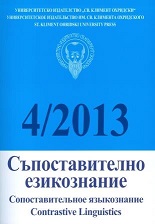A definition of say that
A definition of say that
Author(s): Andrzej BogusławskiSubject(s): Language and Literature Studies
Published by: Софийски университет »Св. Климент Охридски«
Keywords: semantics; pragmatics; knowledge; definition of “say that”; say that vs. say:_.; quotative; rhetic/phatic; functor; propositional function;
Summary/Abstract: In the article a definition of ‘say that’ (with propositional complements) is offered and substantiated. The definition, which is far from being simple, is based, crucially, on the four concepts deemed primitive: ‘know that’, ‘do’, ‘someone’, ‘something’. The English expression say that is taken to be simple in the sense of its indivisibility into say and that as bearers of separate semantic values and to be universal in the sense of its having an exact semantic counterpart in every language; certain other expressions (in English as well as in other languages) are just variants of say that without any independent strictly semantic load (cf., e.g., He said she’s ill. – without that). On the other hand, the author claims that there is an independent unit of language in the form of the quotative say: _. The string say as such is assigned the status of a sheer morphological form rather than that of a genuine unit of language. An attempt is being made to show that none of the two units of language is derivable from the other one in terms of a viable operation (acting as a self-contained linguistic item).
Journal: Съпоставително езикознание / Сопоставительное языкознание
- Issue Year: 2013
- Issue No: 4
- Page Range: 13-42
- Page Count: 30
- Language: English
- Content File-PDF

